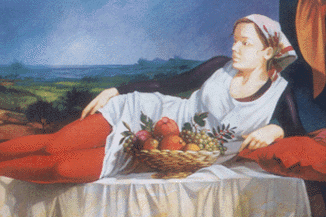...Best of Sicily presents... Best of Sicily Magazine. ... Dedicated to Sicilian art, culture, history, people, places and all things Sicilian. |
by Antonella Gallo | ||
Magazine Index Best of Sicily Arts & Culture Fashion Food & Wine History & Society About Us Travel Faqs Contact Map of Sicily |
In Lo Cascio's masterful images, there are no fat or unattractive females, only appealing, contemplative ones. Perhaps that's how art should be. In the event, these are idealised impressions. Having exhibited in Italy since the early 1960s, the artist has approached numerous themes. He is a master colourist. In Lo Cascio's world, the human form is central, the focus of everything. Though he is a realist, his work indicates a certain measure of imagination. Here the realism is classical, not photographic. It's the mood that counts. His alter ego is that of a graphic designer, and his graphic work appears in numerous publications. His oil paintings, meanwhile, grace private collections in Italy and internationally. It's difficult to categorise artists such as Lo Cascio. They are classicists in an age when classical portraiture is not always popular in fine art, and when the lines between fine and commercial art have blurred. That said, Lo Cascio's art, with its traditional composition and subject matter, could have been created a century or two ago. Here Renaissance techniques meld with occasional impressionist ones, and the results are invariably gratifying. If anything, it's surprising that there are not more classicists like Lo Cascio in Italy, where vestiges of the renaissance and Baroque are evident everywhere. In this sense, Lo Cascio's work is something of another time, if not another place. The colourful contrasts in many of his works are what distinguish them. The reds, for example. The opaque crimson stockings worn by the figure in a recent series make a shapely woman "traditional" yet starkly modern. Here we find the traditional symphony of modern expression. About the Author: Antonella Gallo teaches art in Rome. | |
Top of Page |
 Born in Palermo in 1942, Franco Lo Cascio paints in oils on canvas using the most traditional methods and compositions. In another era, he might have been commissioned by aristocrats to paint portraits. He has, however, painted murals throughout Italy. His work seems to reflect various influences, ranging from Ingres to Degas. In the Studio, shown here, exemplifies a favourite subject, the beautiful woman.
Born in Palermo in 1942, Franco Lo Cascio paints in oils on canvas using the most traditional methods and compositions. In another era, he might have been commissioned by aristocrats to paint portraits. He has, however, painted murals throughout Italy. His work seems to reflect various influences, ranging from Ingres to Degas. In the Studio, shown here, exemplifies a favourite subject, the beautiful woman.